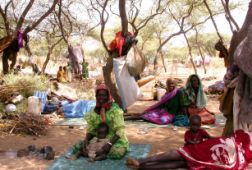Humanitarian needs remain high in Southern Sudan
May 22, 2007 (JUBA) — Humanitarian needs in Southern Sudan remain high or have increased – despite the 2005 peace agreement between the government and former rebels, say aid workers in the region.
 “Following the signing of the CPA [Comprehensive Peace Agreement], donors started to shift from humanitarian funding to funding development projects,” said Nicolas Louis of the European Commission’s Humanitarian Aid Department (ECHO) in Juba, capital of Southern Sudan.
“Following the signing of the CPA [Comprehensive Peace Agreement], donors started to shift from humanitarian funding to funding development projects,” said Nicolas Louis of the European Commission’s Humanitarian Aid Department (ECHO) in Juba, capital of Southern Sudan.
“We find ourselves in a situation where we have a lot of humanitarian needs but the funds available to cover those needs are reduced because development is not happening overnight,” he added.
The shift has occurred largely due to a lack of implementing capacity on the part of Southern Sudan’s fledgling government and partly because pledged resources have yet to be released.
“I meet a lot of partners who have to stop their projects because they have no more funding and they come to ECHO to see if we can cover the gaps before development funds start operating; this is particularly true when it comes to nutrition and health,” said Louis, who participated in 16-21 May mission of donor representatives to Khartoum and Southern Sudan.
The mission comprised Britain’s permanent representative to the United Nations in Geneva, Nicholas Thorne, his Swedish colleague Elisabet Borsiin Bonnier, Claudia Rizzo, counsellor for humanitarian and development affairs at the Swiss Agency for Development and Cooperation, and Dennis McNamara, special adviser on internal displacement to the UN emergency coordinator.
STRETCHED TO THE LIMIT
Bonnier noted the lack of capacity within the government of Southern Sudan and the dearth of funding for projects in the south, but said even available resources were not being disbursed quickly enough to build the infrastructure and provide the services desperately needed by former refugees and internally displaced people (IDPs) returning to the region.
“In both cases [for refugees and IDPs] the picture emerging is that the physical return functions quite well,” she said. “The transport part is a bit slow, but it functions. At the other end, there is not much infrastructure to take care of the increased populations in many places.”
Citing access to water, primary schools and health, she noted that there was very little recovery and reintegration being done. “Much of that is because local governments don’t have the know-how or resources. They are returning to communities that are not very well developed, that are stretched to the limit,” said Bonnier.
UN agencies were endeavouring to meet the humanitarian needs of the returnees, but much more needed to be done.
“The UN has helped to construct roads, which is what is needed for communications and transport; they have helped to create a lot more boreholes [and] helped on the schooling side, but still we are at a very low level. The agencies need to come in much more strongly in the early phases. We get the impression that some of the agencies are not really on the ground at the other end of all these returns.”
Lack of infrastructure, she added, would discourage people from coming back because the situation would not be sustainable. “The risk is that they will leave again. That is a big problem for the government because they are planning for a census that will form the basis for the elections and later referendum,” Bonier added.
HOW TO ENCOURAGE RETURNEES
The Vice-President of Southern Sudan, Riek Machar, acknowledged that return and reintegration was disturbingly slow and that many displaced people now living in the north would not return in time for the census, planned for November 2007.
Bonnier, however, said not all the deficiencies in the reconstruction of Southern Sudan could be blamed on lack of money. Even the disbursement of available resources was taking too long, she said.
“I get the impression that it is not a lack of money per se. We have funds where monies are deposited but they are not being disbursed. That could be because there isn’t any infrastructure to receive it properly,” she added.
Government officials in Southern Sudan criticised the pace of disbursement by the World Bank-administered Multi-donor Trust Fund, created to rehabilitate the region after the signing of the CPA, a view with which Bonnier concurred.
“The intention of that fund was that money would be available in this very crucial time after the peace agreement. Almost two years have passed and only now is money starting to trickle in, in very, very limited form. Something is not as it was intended to be. We will have to look at that for the sake of Southern Sudan,” she said.
DEMOBILISE AND DEVELOP
The sharing of oil revenues between the Government of Southern Sudan (GOSS) and the Khartoum-based Government of National Unity, as provided for under the CPA, was also not being implemented properly. This had exacerbated the financial constraints of the south, forcing the government there to spend about 40 percent of available funds on salaries, mostly for soldiers, because the envisaged disarmament, demobilisation and reintegration (DDR) programme has not been implemented.
GOSS plans to demobilise 101,000 fighters – both regular soldiers and militias that opted to join the Sudan People’s Liberation Army after the peace agreement, according to Machar.
“If this disarmament is not coupled with development and reconstruction and reintegration efforts; if the people who disarm are not provided with another way of living, then there is a big risk that it will not work,” said Bonnier.
(IRIN)
